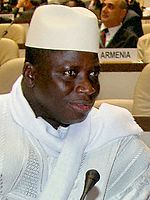Yahya Jammeh wins Gambia presidential election
Saturday, November 26, 2011
In Gambia, current president Yahya Jammeh has won a presidental election, allowing him to take a fourth term in office. According to the election commission, Jammeh gained 72% of the votes.

Image: John Armagh.
Mustapha Carayol, electoral chairman, reported an 83% voter turnout. Carayol also stated Ousainou Darboe, the leader of the United Democratic Party, took 17% of the vote, while Hamat Bah, of the United Front coalition, received 11% of votes. Jammeh was confident that he would win this election, saying: "There is no way I can lose unless you tell me that all Gambian people are mad".
Darboe has disputed the validity of these results, calling them "bogus, fraudulent and preposterous" and claimed that they "constitute a capricious deception of the will of the people". Before polling commenced, the Economic Community of West African States (ECOWAS) expressed concern about the fairness of the election and the freedom of Gambian voters. ECOWAS refused to send poll observers to monitor Gambia’s vote; they cited "intimidation, an unacceptable level of control of the electronic media by the party in power, the lack of neutrality of state and para-statal institutions, and an opposition and electorate cowed by repression and intimidation" as reasons for their refusal to do so.
BBC News Online has reported that the polling was overseen by observers representing the Organisation of Islamic Cooperation, the Commonwealth of Nations, and the African Union (AU). According to Voice of America, AU members were satisfied with the organization of the poll and the conduct of voters. The head of the poll monitoring group at the AU reported: "We didn’t notice any intimidation anywhere. The policemen who were in the polling stations were not armed, and as much as possible tried to do their job without interfering with the process." Meanwhile, Carayol has contested the accusations of ECOWAS, stating that the Gambia election process is "one of the fairest in the world". Carayol explained: "We use marbles; we don’t use ballot papers, [and] we have very few invalid votes. All Gambians understand the system". He insisted that Gambia elections "are free and fair".
Samuel Fonkam, the chairman of ELECAM — Cameroon’s Electoral Board — says members of the group did not witness any incidents of violence or intimidation in the approach to the election. Fonkam said that in all 24 constituencies they observed, "the turnout was massive, orderly, peaceful and really serene". The citizens of the Gambia "demonstrated to those who wanted to see that they are the sovereign masters of their destinies," according to Fonkam.
Jammeh came to power of the Gambia in 1994 as the result of a bloodless coup in which he overthrew the previous president. Speaking about his presidency, Jammeh claimed: "In 17 years, I have delivered more development [to Gambia] than the British were able to deliver in 400 years".
The stance of the Jammeh government on civil liberties has attracted criticism from international rights groups, with particular disapproval drawn to the government's attitude towards freedom of the press, as well as the disappearance of journalists there and the detaining of journalists within the country. Jammeh responded to this criticism by stating: "The journalists are less than 1% of the population and if anybody expects me to allow less than 1% of the population to destroy 99% of the population, you are in the wrong place."
Last year, eight people accused of plotting Jammeh's overthrow were sentenced to death. In 2007, Jammeh claimed that the sexually transmitted infection AIDS could be cured through the use of a herbal concoction. In 2008, he said he would sentence homosexuals to execution by beheading. The three elections Jammeh previously won have also received a substantial amount of criticism.
Sources
- "Gambia's Yahya Jammeh wins fourth presidential term" — BBC News Online, November 25, 2011
- Peter Clottey. "African Union Observers Impressed With Gambia Election" — Voice of America, November 24, 2011

